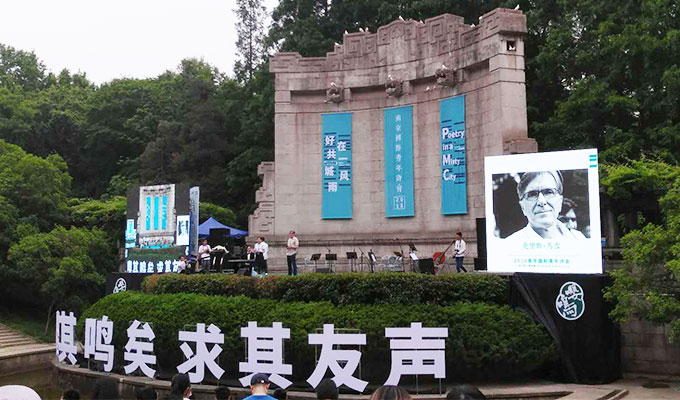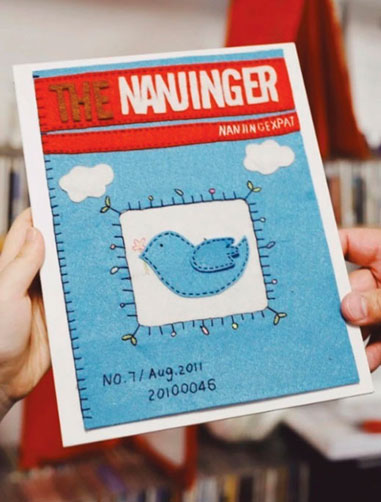My heart sunk a few fathoms when I learned that I was to cover the international poetry event organised by the Nanjing Youth League for National Youth Day. Despite my degree in English, I don’t have a poetic bone in me to sit through an imaginable lullaby without dribbling onto my lap, or snoring shamelessly. Given how fast-paced and short-lived our age of consumerism is, poetry, let’s be frank, is nearly as dead as print media. As any responsible journalist would, I drank two cans of Red Bull in the Didi ride to the event and showed up fashionably early and flatulently thrilled.
Backstage, I talked to a participant from San Fransisco, who wore a pair of hipster glasses and Dr. Martin boots while mercury that day popped over 27ºC. I asked him about his poem and why he wrote it. He shrugged and adopted a sexier tone of voice, “I actually don’t have much to say about poetry. I just write about what I care about and people go ‘Oh that’s great!’ while I go on drinking”. Did I get it right? Did he just, in a way, admit that poetry can be…fun? This question kept flying around in my head like the stupid doves flapping above.
A symphony struck at 16:00 marking the beginning of the event, which went on for 2 and a half hours. Perched upon our uncomfortable staircase that looks down onto the stage, I surprised myself when I began pondering over a line from the prologue; “I want to be a poem/for you to read/to set you free”; and attempted to deconstruct its true meaning. I didn’t have an explanation as to why I couldn’t let go of some words that could literally mean so much.
Poetry epitomises perhaps our eagerness to express and frustration to articulate. It is in such eagerness and frustration where we begin to find the reflection of ourselves, the same ambiguity that holds sway, and a shared piece of humanity, deliberately shunned by a contemporary demand for context-free formality. But language is context-bound. For a large proportion of history language has been intimate and served as a vector for emotional units before it became nothing more than an invasive instrument to meet the demands of a post-industrial society.
The society we live in today relies on sustained and perpetual growth, and whose favoured mode of social control is universal Danegeld, or in other words, buying off social aggressions with material advancement. Its fatal weakness, however, is the ineptitude to survive any temporary reduction of social bribery. But growth can never be perpetual, at least not without striking parallels in the condition we have invented which is also the vision. For example, modern society is not mobile because it is egalitarian; it is egalitarian because it needs to be mobile and productivity hinges on a highly mobile division of labours. By the same token, education has not become universal for the purpose of individual development; rather, it is social development that demands precise communication between strangers and a standardisation has pervaded a generic education.
A while back, when I taught SAT (Scholastic Aptitude Test) English, I remember reading an instruction for the writing part of the test in Barron’s. The instruction dictates that students should read a piece called “Beauty Is in the Eyes of the Beholder” and write a persuasive essay on how the author brings across the message. Where it states that students should not imply any personal feelings in their analysis, the piece talks about how any response to creative works, any criticism, should be personal because “I’m the best in the world in deciding what is pleasant to me”.
Paraphrasing Oscar Wild in “The Critic as an Artist”, we should not confine ourselves to the intentions of artists because the meaning of any beautiful creation is “as much in the soul of him who sees it, as it is in his soul who wrought it”. But the soul who sees it doesn’t matter a dime now, and why should it? What is art in the face of material enhancement? What couldn’t we give for the unrealistic expectation of eternal cornucopia? Since science has discovered that everything is de facto about algorithm, the teaching of humanities sets on the irrevocable route of dehumanising, and artfully incorporating rules into a cauldron of emotion.
Nanjing’s youth poetry event ended with a great finale poem, “High Flight”. Written by John Magee. Jr., who dedicated his life at the age of nineteen to the fight against the Nazis, and whose father, John Magee, had rescued the lives of tens and thousands of defenceless Chinese during the notorious Nanjing Massacre. High Flight was recited by great grandson Chris Magee.
Granted, not all works of art are supposed to speak to us, but when they do, they are indelible. I looked up on the stage at the hipster poet as he recited his poem and thought about what he said earlier backstage. The beauty of poetry roots in not giving a damn about anything but the moment, and it is such disregard that arouses empathy from the audience.











